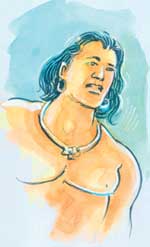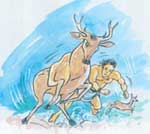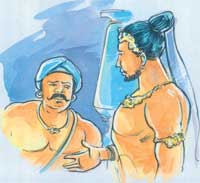| This
article is part of a continuing series on the ‘Mahavamsa’,
the recorded chronicle of Sri Lankan history.
Warrior Mahasona
 It was the 2nd century BC. The entire ‘Raja-rata’
was under Chola rule. Even though King Elara tried his best to
rule in a fair way, the Tamil army ran riot. They oppressed the
Sinhala people and plundered their wealth. Unfortunately, King
Elara was kept ignorant of the misbehaviour of these soldiers.
At this time, there was a prosperous village named Hundasi Vapi
in the Kulumbari district. There lived a wealthy chieftain named
Tissa.
It was the 2nd century BC. The entire ‘Raja-rata’
was under Chola rule. Even though King Elara tried his best to
rule in a fair way, the Tamil army ran riot. They oppressed the
Sinhala people and plundered their wealth. Unfortunately, King
Elara was kept ignorant of the misbehaviour of these soldiers.
At this time, there was a prosperous village named Hundasi Vapi
in the Kulumbari district. There lived a wealthy chieftain named
Tissa.- Tissa had
eight sons, of whom the youngest was named Sona. He looked quite
different from his brothers. He was good-looking and stronger
than a normal child of his age. So he attracted the eyes of everyone.
As Tissa was a village chief, many were the people, who came to
his house, on various business. Everybody who dropped in there
used to carry Sona and pet him. His parents too showered a special
love on him, as he was the youngest.
- Sona grew
up amidst luxury. He even had servants to attend on him. But Sona
loved the company of innocent village boys. He helped them whenever
he got a chance and spent most of his time, playing with them.
He was a fast runner. He was so strong that even a grown up man,
could not stand a blow from him. This made the village boys afraid
of him. They began to respect him.
 When Sona was seven years old, he looked far too big for his age.
He was extraordinarily strong and could uproot a palm tree as
if he was removing love-grass. As Sona loved the simple village
folk, he often helped them in their ‘chena’ cultivation.
When the jungle was cleared, to prepare the land for cultivation,
Sona was there, to give a helping hand. He alone did the work
of seven or eight adults. He often gave chase to deer, ran fast
and caught them but never allowed anybody to kill them.
When Sona was seven years old, he looked far too big for his age.
He was extraordinarily strong and could uproot a palm tree as
if he was removing love-grass. As Sona loved the simple village
folk, he often helped them in their ‘chena’ cultivation.
When the jungle was cleared, to prepare the land for cultivation,
Sona was there, to give a helping hand. He alone did the work
of seven or eight adults. He often gave chase to deer, ran fast
and caught them but never allowed anybody to kill them.- When Sona’s
father got to know, what mischief he was up to, he advised him.
Sona listened patiently but never obeyed. Thought the father advised
repeatedly, there was no change for the better. Sona continued
to be stubborn. When Sona turned ten, it is said, that he had
the strength of ten elephants.
 However strong and powerful Sona was, he loved the villagers and
they in turn loved him. They could not do without him. It was
then, that the entire village started talking about the extraordinary
strength of Sona. This news spread as far as Magama. King Kavan-Tissa
sent messengers summoning Tissa to the palace.
However strong and powerful Sona was, he loved the villagers and
they in turn loved him. They could not do without him. It was
then, that the entire village started talking about the extraordinary
strength of Sona. This news spread as far as Magama. King Kavan-Tissa
sent messengers summoning Tissa to the palace.- When Tissa
met the king, the king said, “I sent for you, seeking your
help. I need your youngest son, Sona, to join the king’s
service”. Tissa remained silent. His eyes swelled with tears.
Noticing this, the king said, “Do not feel sad. Instead
be proud of the fact, that you have a son, who could join the
king’s service and protect the country. So many sons like
Sona are here with me.
 Their parents brought them here very willingly. I look after them
as if they are my own. It is not for my personal service, that
I need them. It is to protect the country from the Cholas. So
you be a brave father, who has gifted his son for the service
of the country”.
Their parents brought them here very willingly. I look after them
as if they are my own. It is not for my personal service, that
I need them. It is to protect the country from the Cholas. So
you be a brave father, who has gifted his son for the service
of the country”.
- Tissa could
not say “No”. he entrusted the care of his son to
King Kavan-Tissa. Sona was delighted. He came to be known as ‘Maha-Sona’.
He received a full course in the art of warfare. Later, he fought
bravely in crucial battles like the one at Vijitha-pura, which
was a citadel of Chola power.
By
Halaliye Karunathilaka
Edited and translated by Kamala Silva
Illustrated by
Saman Kalubowila |
 It was the 2nd century BC. The entire ‘Raja-rata’
was under Chola rule. Even though King Elara tried his best to
rule in a fair way, the Tamil army ran riot. They oppressed the
Sinhala people and plundered their wealth. Unfortunately, King
Elara was kept ignorant of the misbehaviour of these soldiers.
At this time, there was a prosperous village named Hundasi Vapi
in the Kulumbari district. There lived a wealthy chieftain named
Tissa.
It was the 2nd century BC. The entire ‘Raja-rata’
was under Chola rule. Even though King Elara tried his best to
rule in a fair way, the Tamil army ran riot. They oppressed the
Sinhala people and plundered their wealth. Unfortunately, King
Elara was kept ignorant of the misbehaviour of these soldiers.
At this time, there was a prosperous village named Hundasi Vapi
in the Kulumbari district. There lived a wealthy chieftain named
Tissa. When Sona was seven years old, he looked far too big for his age.
He was extraordinarily strong and could uproot a palm tree as
if he was removing love-grass. As Sona loved the simple village
folk, he often helped them in their ‘chena’ cultivation.
When the jungle was cleared, to prepare the land for cultivation,
Sona was there, to give a helping hand. He alone did the work
of seven or eight adults. He often gave chase to deer, ran fast
and caught them but never allowed anybody to kill them.
When Sona was seven years old, he looked far too big for his age.
He was extraordinarily strong and could uproot a palm tree as
if he was removing love-grass. As Sona loved the simple village
folk, he often helped them in their ‘chena’ cultivation.
When the jungle was cleared, to prepare the land for cultivation,
Sona was there, to give a helping hand. He alone did the work
of seven or eight adults. He often gave chase to deer, ran fast
and caught them but never allowed anybody to kill them. However strong and powerful Sona was, he loved the villagers and
they in turn loved him. They could not do without him. It was
then, that the entire village started talking about the extraordinary
strength of Sona. This news spread as far as Magama. King Kavan-Tissa
sent messengers summoning Tissa to the palace.
However strong and powerful Sona was, he loved the villagers and
they in turn loved him. They could not do without him. It was
then, that the entire village started talking about the extraordinary
strength of Sona. This news spread as far as Magama. King Kavan-Tissa
sent messengers summoning Tissa to the palace. Their parents brought them here very willingly. I look after them
as if they are my own. It is not for my personal service, that
I need them. It is to protect the country from the Cholas. So
you be a brave father, who has gifted his son for the service
of the country”.
Their parents brought them here very willingly. I look after them
as if they are my own. It is not for my personal service, that
I need them. It is to protect the country from the Cholas. So
you be a brave father, who has gifted his son for the service
of the country”.